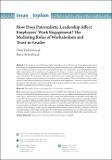DSpace Repository
How Does Paternalistic Leadership Affect Employees' Work Engagement? The Mediating Roles of Workaholism and Trust-in-Leader
- DSpace Home
- →
- Web Of Science
- →
- Web Of Science
- →
- View Item
JavaScript is disabled for your browser. Some features of this site may not work without it.
| dc.contributor.author | Koçak, Ömer Erdem
|
|
| dc.date.accessioned | 2024-03-26T07:28:21Z | |
| dc.date.available | 2024-03-26T07:28:21Z | |
| dc.date.issued | 2021 | |
| dc.identifier.issn | 2146-7099 | |
| dc.identifier.issn | 2602-2745 | |
| dc.identifier.uri | http://hdl.handle.net/11547/11432 | |
| dc.description.abstract | In this study, we contend that paternalist leadership can be an effective way of managing people and can pave the way for employee motivation and well-being, despite several previous studies linking it to adverse outcomes. In addition, we propose two possible underlying mechanisms (i.e., workaholism, trust in leadership) linking a leader's paternalistic style to employee work engagement. By doing so, we aim to understand whether paternalist leaders positively influence their subordinates through a social connection path (trust in leader) or task-focusing path (workaholism). We conducted a field survey and collected cross-sectional data using online surveys from 413 participants working in various industries in Istanbul to test the hypotheses. The results indicate a positive relationship to exist between paternalistic leadership and employee work engagement. Therefore, we put forth that the paternalistic leadership style can be beneficial through the task-focusing and social connection paths, contrary to the beliefs commonly shared in Western countries. | tr_TR |
| dc.language.iso | en | tr_TR |
| dc.relation.ispartofseries | 11;3 | |
| dc.subject | SELF-DETERMINATION THEORY | tr_TR |
| dc.subject | ETHICAL LEADERSHIP | tr_TR |
| dc.title | How Does Paternalistic Leadership Affect Employees' Work Engagement? The Mediating Roles of Workaholism and Trust-in-Leader | tr_TR |
| dc.type | Article | tr_TR |
Files in this item
This item appears in the following Collection(s)
-
Web Of Science [958]
